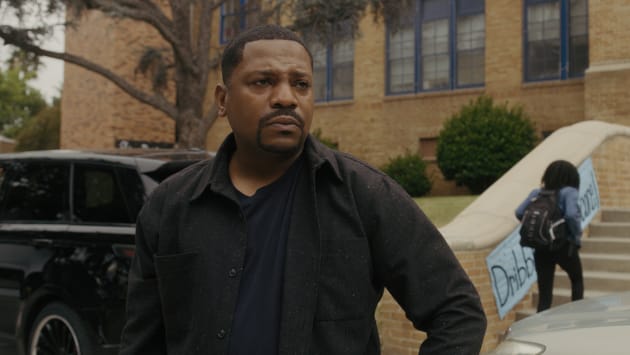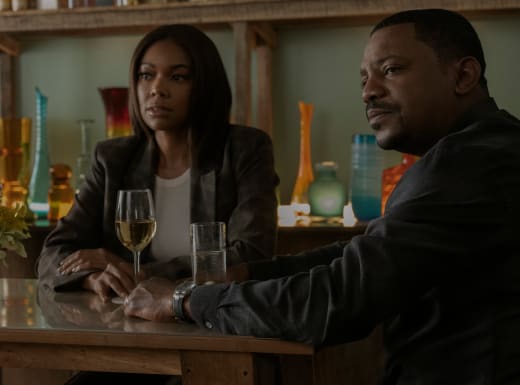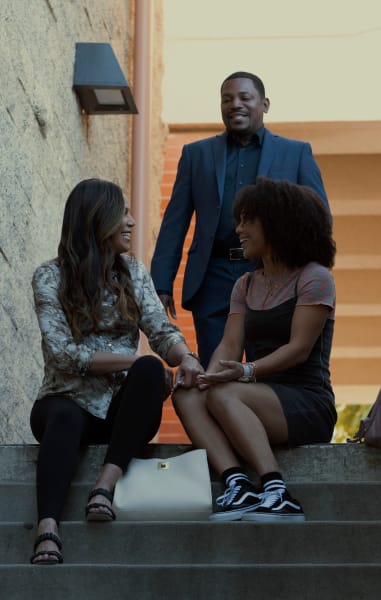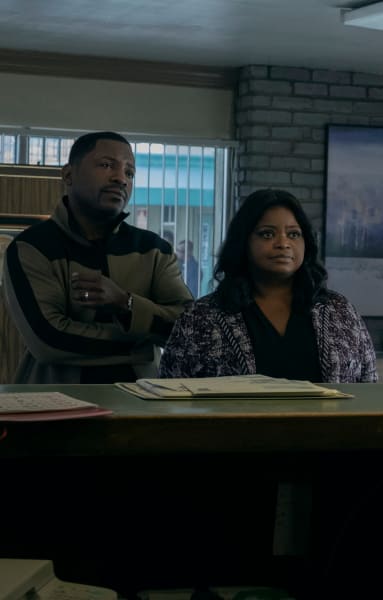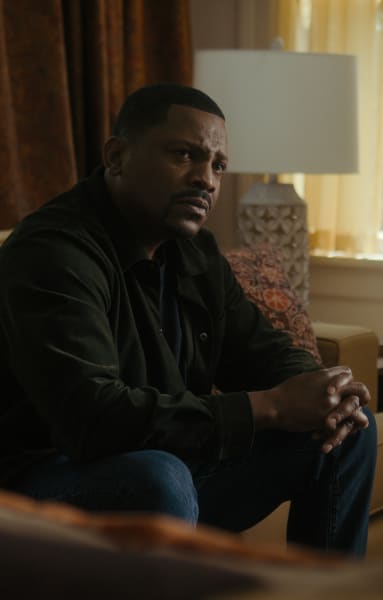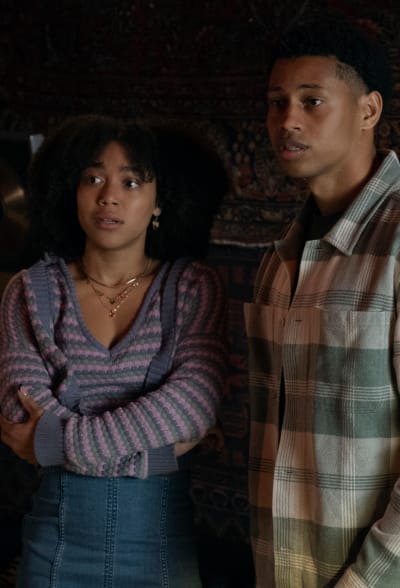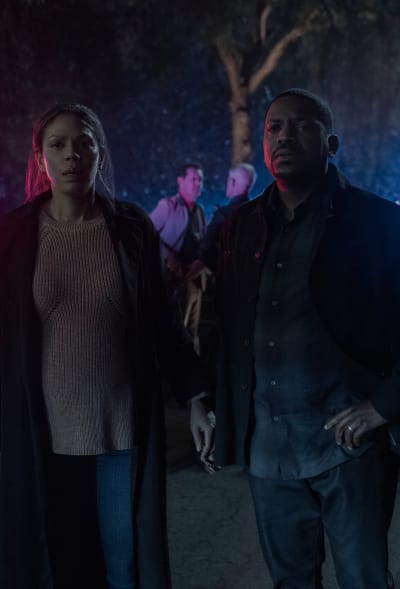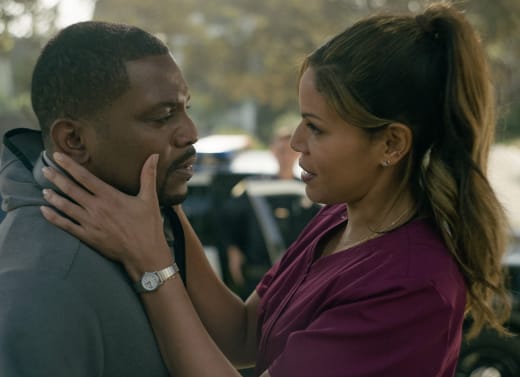Poppy Montgomery’s latest case on the Apple TV+ series Truth Be Told hits very close to home, as her dear friend Markus’s family is caught up in a nightmare when his daughter, Trini, is lured into a trafficking scenario.
Mekhi Phifer imbues Markus Killebrew with raw emotions as he stands tall for his wife and relies on others to bring his girl back home.
We talked with Phifer about Markus’s journey so far and how he might handle the family’s latest blow, which comes on the heels of Trini’s rescue.
You have a really exciting story this season on Truth Be Told.
Absolutely. I was really happy about that. I remember when we were getting ready to go into Season 3, Octavia, who is a very dear friend of mine, called me and said, “Hey, look, Mekhi, man, you’re going to be having to do a lot of heavy lifting this season.” And I said, “Hey, this is what I do. Let’s do it.” And so I was very, very happy about that.
It seems like the story has been simmering for a couple of seasons now. At what point did you know that it would culminate in Trini being trafficked?
At the end of Season 2, you see a glimpse of that happening with the presence of her little, new-found boyfriend, Aubrey. You didn’t necessarily, know the extent to which it was going to go. But I kind of knew that something was going to start brewing and culminating into what you see in Season 3.
It’s shining a light on the unequal treatment of Black, endangered, missing girls versus their white counterparts, which is timely and very topical What does it feel like to be a part of this story and give this topic the attention it deserves?
We pride ourselves on being a true-crime show, and the key word being true. Meaning that it delves into reality. Now, when you talk about 70,000 plus Black and Brown girls that have just gone missing, and no media coverage, no actual police presence, and no progress on these cases; these girls are just written off.
Then when you have somebody in our particular case, like Emily, who, like you said, is our white counterpart, but then she gets all of the media coverage. Now, all of a sudden, there’s an outcry in the community. It’s like, “Where is Emily?”
But what about all of these other girls who were trafficked or are just missing? They’re just gone. And they come from good homes as well, and their mothers and fathers are respectable pillars in their communities.
So it really lends itself to a true-crime genre because people can truly relate. And not just Black and Brown but white and Asian, as well. I mean, we are all in this thing together.
It’s who gets the coverage when a child goes missing. Who gets the support from law enforcement, from politicians, from media coverage? Who truly gets the support?
So what we want to say is we don’t want Emily to be missing either. But you can’t ignore this other whole segment of the community and of the nation and of the world because you deem them not as worthy, whether it’s being done consciously or subconsciously.
So what we do on this show is shed light that we all, everyone, matters. Everyone should get the same equal coverage when it comes to these types of things. Then how do we, as a society, help rectify the wrongs? And that’s what we’re dealing with here. And I love that.
Right. I do, too. I think it’s doing a really good job of it. We’ve seen a lot of it on a smaller scale. But having an entire season devoted to it, I think it’s making more of an impact.
Right. Yeah, and I think people start to realize that what we’re doing is educating through entertainment.
Absolutely.
What I love about this show is it starts out with some of the parents at a meeting saying, “Well, my daughter’s not Drea. She’s not on drugs.” Or, “My daughter’s not like that. My daughter wouldn’t…”
Everyone’s susceptible to this. It’s not because you happen to be a lawyer and your husband’s a doctor. No, this still can happen. That’s why they call it grooming. It’s not just thrown into the life. There’s a grooming process that happens. These victims form a dependency on the people that are trafficking them.
They form a dependency on the person that they’re trying to please and wind up doing things that you would never think these girls from these wonderful neighborhoods and wonderful schools would do. What we tried to do is shed light that it could happen to anybody.
So we’re educating the parents that may be running around with blinders on. Like, “Look, once your kids turn 16, 17, you’re not going to know everything that they do, who they talk to, who they’re texting, what social media sites they’re looking at.” So you got to really keep your eyes open.
I think a really important aspect of this story is how we follow Trini’s relationship with Aubrey. Because a lot of times, unfortunately, girls fall in love with the bad boy. It’s historically relevant that that’s what they do. And with this strange society today, that means something entirely different.
But here’s the thing. Here’s the caveat. See, the thing is, you also have guys like Aubrey, who were going to camp wholeheartedly, but then they want to be bad boys.
So they get groomed by wearing a gold chain or watching videos on YouTube and Instagram. They’re from the suburb. They have a great life. Their mother and father are very prominent. They live in culdesacs. But then they want to try to be a part of this world. Then they wind up getting groomed just like they’re grooming the girls.
So you’re not really ready for this lifestyle. This is not really you. You’re really a wholesome kid from the suburbs, but you’re getting groomed, too. Do you see what I’m saying? And it goes on and on and on.
Exactly. And by saying the bad boy, it doesn’t necessarily mean that they’re already in a life of crime. But boys, in general, can take on that machismo, and they pretend like they’re more than they are.
Of course.
Then, as you say, they are, too, being groomed because they see, even in areas of entertainment, they see it’s kind of cool. It’s cool to be that, and then bad things can happen.
Oh, absolutely. Absolutely. When you start to look at it from that aspect, when you look at guys who supposedly killed themselves, like Epstein and those kinds of people, you would never, just by looking at him, think that this is what he was into.
Right.
Do you know what I mean? So, you can’t judge a book by its cover. A lot of times, what happens is, whether it’s these girls or whether it’s kids like Aubrey or even Trey, who got killed in the last episode, they wound up getting caught up in this life, and now they in over their heads.
Now you are almost stuck here and stuck in this perpetual cycle of being exploited. And as you live in that life longer and longer, it’s that much harder and harder to swim out of it.
Right. On Friday’s episode, it seems like Trini’s horrifying journey is coming to an end. Then Social Services steps in and throws an entirely different wrench into an already suffering family.
Mm-hmm. Absolutely.
How is that going to affect them in the coming episodes?
Well, I don’t want to give the story away. But there’s definitely going to be a cause and effect. There’s no question about it. How it affects them is going to be very specific, but it definitely will have an effect that I think will intrigue people.
And Markus’ journey hasn’t always been easy. He’s struggled with addiction and cheating on his wife and things like that.
Right. Right. Mm-hmm.
I can’t imagine he’s not going to collapse a little bit under the weight of this. Especially because that light was at the end of the tunnel. She’s out of that right now. We’ve got her back in our arms. And then somebody just pulls her away again.
Right. Well, we’ll see. I can’t confirm or deny. But like you said, this season is a rollercoaster. I mean, you talk about ups and downs and twists and turns and loopity loops, it’s a full gamut of all of those things.
If you could describe the second half of the season without spoiling anything, how would you do that?
It’s shocking. I would say I almost dare someone to try to solve the crime right now without seeing the rest of the episodes. It’s definitely a nail-biter, edge-of-your-seat type ride.
And my last question for you is, you’re a father of two boys. What’s it been like having this journey onscreen as a father of a daughter, with everything that you’re learning about this story in our world?
Yeah, I mean, look, what’s so great about this season is that when you look at Trini, obviously, she’s being groomed, but look, so is Aubrey. So there’s not a big difference in the female aspect, except that obviously, she’s going to be used for sexual exploitations, which is tough.
But I think in raising kids, and if you’re a present parent, it’s always nerve-wracking when your kids go out, or go with their friends or go to school, and you’re not there to lend guidance and protection.
I don’t have any daughters in real life, but I can only imagine myself as a dad, how I’d be a little bit more, probably extra protective of a daughter. I’m still very protective of my sons, and that’s why they’ve never had any issues. But yeah, I would be, probably, a little bit more protective.
Truth Be Told airs on Apple TV+ with new episodes every Friday.
Carissa Pavlica is the managing editor and a staff writer and critic for TV Fanatic. She’s a member of the Critic’s Choice Association, enjoys mentoring writers, conversing with cats, and passionately discussing the nuances of television and film with anyone who will listen. Follow her on Twitter and email her here at TV Fanatic.
